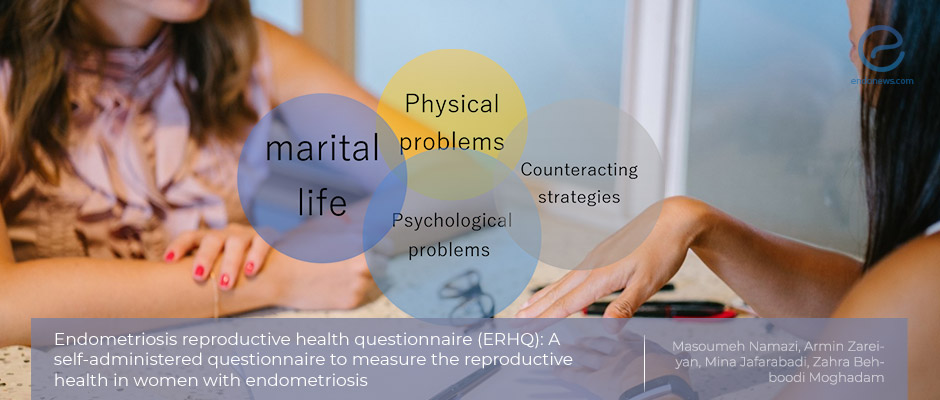Assessment of Reproductive Health for Women With Endometriosis
Oct 16, 2020
The new self-administered questionnaire can reliably measure the reproductive health of women with endometriosis.
Key Points
Highlights:
- Researchers developed a new questionnaire that could reliably measure reproductive health in women with endometriosis.
Importance:
- The questionnaire will help better understand the impact of endometriosis on women’s reproductive health to develop better strategies.
What's done here:
- Researchers interviewed 20 women with endometriosis and created item pools that they then tested for face, content, and construct validity.
Key results: Four important factors for reproductive health were identified:
- Physical problems (8 items ranging from pelvic and abdominal pain to heavy periods)
- Psychological problems (12 items, including worries of infertility, disease recurrence, passing the disease onto children, having malignancy, feelings of being different, loss of self-confidence)
- Counteracting strategies (heat-packs, complementary medicine, see friends to feeling better, exercising, getting more information about the disease, working)
- The instability of marital life (8 items ranging from regret about marriage to dispute with the partner, pain during and after sex, to hopelessness because of lack of sexual orgasm)
Limitations:
- Researchers could not classify the participants in terms of endometriosis grade, so the impact of the severity of endometriosis cannot be measured with this questionnaire.
- The study population was small and did not comprise women from a diverse geographical and ethnic background.
Lay Summary
Researchers in Iran developed a new and reliable patient-generated instrument to measure the reproductive health of women with endometriosis. Health providers as well as researchers can use the questionnaire to better understand the impact of the disease on women’s reproductive health over time and better meet their needs.
Endometriosis affects many dimensions of reproductive health in affected women including physical, psychological, and sexual function. This is the first instrument that measures reproductive health in women with the disease.
Researchers used a mixed-method design and three study phases to develop the questionnaire: In the first phase, they interviewed 20 women with endometriosis. In the second phase, they created item pools and in the third phase, they assessed the face, content, and construct validity of the questionnaire. Face validity is the effectiveness of the questionnaire in meeting its aims. Content validity is the extent to which the items on the questionnaire are representative of the entire domain the questionnaire seeks to measure. Finally, construct validity refers to the degree to which inferences can be made from the questionnaire.
Researchers identified four factors that were important. These were physical problems, psychological problems, counteracting strategies, and the instability of marital life.
The first factor included nine items ranging from pelvic and abdominal pain to heavy bleeding with periods, among others. The second factor included 12 items such as worries about infertility, disease recurrence, passing the disease onto the children, and the disease becoming malignant, as well as feelings of being different from others and loss of self-confidence. The third factor had six items: using heat packs, complementary medicine, going to see friends for feeling better, exercising, getting more information about the disease, and working.
Finally, the fourth factor had eight items that ranged from regret about marriage to dispute with partner and pain during and after sexual activity to hopelessness because of lack of sexual orgasm.
The researcher called the questionnaire the endometriosis reproductive health questionnaire (ERHQ) and, following statistical analyses, concluded that it is a valid measure of reproductive health in women with endometriosis.
Research Source: https://pubmed.ncbi.nlm.nih.gov/32652304/
questionnaire reproductive health

